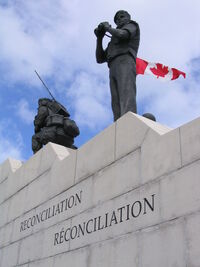Assessment |
Biopsychology |
Comparative |
Cognitive |
Developmental |
Language |
Individual differences |
Personality |
Philosophy |
Social |
Methods |
Statistics |
Clinical |
Educational |
Industrial |
Professional items |
World psychology |
Social psychology: Altruism · Attribution · Attitudes · Conformity · Discrimination · Groups · Interpersonal relations · Obedience · Prejudice · Norms · Perception · Index · Outline

A monument to reconciliation in Ottawa.

Designed by Josefina de Vasconcellos, the statue of Reconciliation in St. Michael's Cathedral in Coventry depicts two former enemies forgiving each other.
Reconciliation may mean the following:
- Reconciliation may be seen as part of a process of a relationship gone wrong, typically as the result of one party causing a rift, by putting an end a relationship of enmity and by substituting for one of peace and good will. This may be the relationship between individuals or between nations.
- The International Reconciliation Coalition: "The path to reconciliation begins with individual acts of confession. Paradoxically, the greatest wounds in human history, the greatest injustices, have not happened through the acts of some individual perpetrator; rather through the institutions, systems, philosophies, cultures, religions and governments of humankind. Because of this, we, as individuals, are tempted to absolve ourselves of all individual responsibility. However, unless somebody chooses to identify themselves with corporate entities, such as the nation of our citizenship, or the subculture of our ancestors, the act of honest confession will never take place. This leaves us in a world of injury and offense in which no corporate sin is ever acknowledged, reconciliation never begins and old hatreds deepen."
- According to the Needs-Based Model of Reconciliation conflicts threaten victims' sense of agency and perpetrators' moral image. The exchange of empowering and accepting messages between victims and perpetrators (for example, through using the "apology-forgiveness cycle") can restore their impaired dimensions of identity (i.e., victims' agency and perpetrators' moral image) and consequently increase their willingness to reconcile with each other.
See also[]
- Truth and reconciliation commission
- Conflict resolution research
- Conflict resolution, Dispute resolution
References[]
- Cordoni, G., & Palagi, E. (2008). Reconciliation in wolves (Canis lupus): New evidence for a comparative perspective: Ethology Vol 114(3) Mar 2008, 298-308.
Shnabel, N. & Nadler, A. (2008). A needs-based model of reconciliation: Satisfying the differential emotional needs of victim and perpetrator as a key to promoting reconciliation. Journal of Personality and Social Psychology, 94, 116-132.